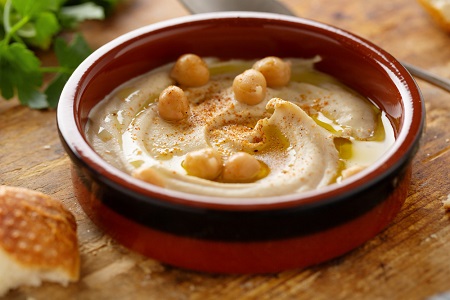Hummus Is Great for Your Health
 The rapidly rising popularity of Mediterranean food means that besides eating out more often to get a taste of this great cuisine, people are also adding these dishes to their menus at home. What many do not realize is that the food of this region is not just tasty, it has innumerable health benefits too. One of the most popular Mediterranean dishes, hummus, is a great example of this. It has a wonderful flavor, it can be eaten with flatbread, used as a dip, and can also be a part of dishes from all over the world. Additionally, it is easy to prepare and does not involve spending a long time at the stove or oven. As for health benefits, here they are:
The rapidly rising popularity of Mediterranean food means that besides eating out more often to get a taste of this great cuisine, people are also adding these dishes to their menus at home. What many do not realize is that the food of this region is not just tasty, it has innumerable health benefits too. One of the most popular Mediterranean dishes, hummus, is a great example of this. It has a wonderful flavor, it can be eaten with flatbread, used as a dip, and can also be a part of dishes from all over the world. Additionally, it is easy to prepare and does not involve spending a long time at the stove or oven. As for health benefits, here they are:
It is full of protein. A 3.5 ounce serving of hummus contains:
- Manganese: 39% of the RDI (recommended daily intake)
- Copper: 26% of the RDI
- Folate: 21% of the RDI
- Magnesium: 18% of the RDI
- Phosphorus: 18% of the RDI
- Iron: 14% of the RDI
- Zinc: 12% of the RDI
- Thiamin: 12% of the RDI
- Vitamin B6: 10% of the RDI
- Potassium: 7% of the RDI
- Calories: 166
- Fat: 9.6 grams
- Protein: 7.9 grams
- Carbs: 14.3 grams
- Fiber: 6.0 grams
All this makes hummus a great source of essential proteins and minerals. While it is good for everyone, vegetarians and vegans (who may worry about their protein intake adequacy) will especially benefit from eating hummus. Hummus also contains B vitamins, iron, folate and phosphorus.
Also read: What Is Mediterranean Food?
- It helps to fight inflammation. When the body is infected, injured or unwell, the resulting inflammation is a sign that the system is trying to protect itself and recover. However, if the inflammation lasts longer than necessary, the condition can become chronic and result in a variety of health issues. The ingredients in hummus like olive oil and chickpeas, help to control inflammation.
- Hummus is rich in fiber which is good for the digestive system.
- Chickpeas, the main ingredient of hummus have a low glycemic index (GI). Foods with high GI are digested and absorbed into the system quickly, resulting in a sharp rise and subsequent fall in blood sugar levels. Low GI foods are absorbed slowly causing a more balanced increase and drop in blood sugar levels.
- Studies show that there is a strong possibility that hummus helps to lower the LDL (bad) cholesterol levels which is good for the heart. The heart-healthy fats that olive oil contains are an added benefit.
- Studies also show that those who consume chickpeas regularly are less likely to be obese and also have a low body mass index as compared to those who do not eat chickpeas.
- Hummus is great for those who suffer from food-related allergies. It is dairy, gluten and nut free so it can be eaten safely by those who suffer from these most common allergies.
Great taste, easy to prepare, adaptable to any type of cuisine and good for health – how may foods fit this description? To start enjoying the many health benefits of hummus, go to a grocery store selling Mediterranean food in San Mateo or buy hummus, falafel and other regional foods from a Mediterranean deli.
- Aug 26, 2022
